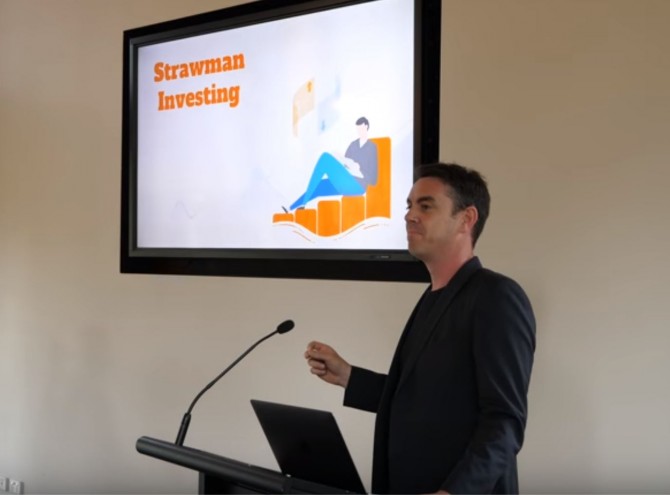
During the week I caught up on a podcast with Howard Marks and Morgan housel — two thinkers in the financial space I greatly admire. (Shoutout to Karmast for suggesting it!)
The main topic was debt, and how it narrows the range of outcomes an investor can endure. And it showed how successful investing is less about brilliance and more about resilience.
In many ways, it was basic stuff; ‘investment 101’ as Housel put it. But the lessons discussed are the kinds of things that are too easily forgotten, especially by the high-IQ types who tend to think they can outmanoeuvre all the pitfalls.
The discussion led to some great observations. Let’s dig into some of them.
Endurance vs. Maximization
As investors it’s natural that we should want to maximise our profits, but such a focus usually ends up taking us out of the game.
Housel told the story of Rick Guerin who was a close contemporary of Warren Buffett and Charlie Munger in the 1960s. The trio frequently made investments together, collaborating on many deals and sharing insights. All had enviable track records.
Their paths diverged, however, in 1974 when Guerin was wiped out due to excessive leverage.
Buffett later said “Rick was just as smart as us, but he was in a hurry.”
The idea of optimising for survivability over shorty term results is also well demonstrated by investment firm PIMCO’s concept of “Strategic Mediocrity” — a deliberate investment strategy that prioritizes consistent, long-term performance over short-term outperformance.
In any given one year period, they were rarely among the top performing money managers. But in every 10 year period they would always be in the top 10%, and often the top 5%.
Slow and steady wins the race.
Don’t avoid risk
Risk management, not risk avoidance, is at the core of successful investing. By trying to avoid risk all you do is guarantee mediocrity — which, ironically, is its own risk over longer timeframes.
The fact is that risk, which is often (and incorrectly) associated with volatility, is unavoidable. For example, a 20% market drawdown isn’t a risk; over any meaningful timeframe it is an inevitability. So the trick is to not try and dodge these events — a practically impossible task — but to prepare for them.
Volatility is the cost of admission for share market investors, and those that can endure it tend to be extremely well compensated.
Of course, everyone thinks they are above average in this regard, so it is important to be honest with yourself here. If you aren’t good at tolerating volatility (and most of us aren’t), it’s better to deliberately seek lower returning assets, because at least you won’t be shaken out when things get scary.
Losses are guaranteed
Howard Marks recounted a story from the early 1980s when he was managing high-yield bonds at Citibank and was interviewed on TV. The interviewer asked, “How can you invest in high-yield bonds when you know some are going to default?”
Marks responded with an analogy comparing investing to the life insurance business: the fact that every client will eventually die is fine, you just price the policy appropriately. Likewise, because you know that some of your investments will go south, you just ensure you are appropriately diversified and have clear sell triggers for when a thesis breaks.
Frankly, if you’re not suffering the odd blow-up, you’re probably not taking enough risk
The Financial Instability Hypothesis
Hyman Minsky said that during stable periods, people grow complacent, take on more risk and leverage, and inadvertently set the stage for the next crisis. When things invariably go pear-shaped, pessimism drives panic selling, de-leveraging, and heightened caution — effectively clearing the decks for the next cycle.
These cycles are a consequence of human psychology and our tendency to project recent experiences into the future. We tend to think the good times will last forever, and it always seems darkest before the dawn.
Buffett’s suggestion to “be greedy when others are fearful, and fearful when others are greedy” is a good one for exactly this reason.
Bottom line
The ‘big ideas’ in investing are both obvious and eternal, but all too easily forgotten. Which is exactly why this podcast is worth a listen.
Strawman is Australia’s premier online investment club.
Members share research & recommendations on ASX-listed stocks by managing Virtual Portfolios and building Company Reports. By ranking content according to performance and community endorsement, Strawman provides accountable and peer-reviewed investment insights.
Disclaimer– Strawman is not a broker and you cannot purchase shares through the platform. All trades on Strawman use play money and are intended only as a tool to gain experience and have fun. No content on Strawman should be considered an inducement to to buy or sell real world financial securities, and you should seek professional advice before making any investment decisions.
© 2024 Strawman Pty Ltd. All rights reserved.







